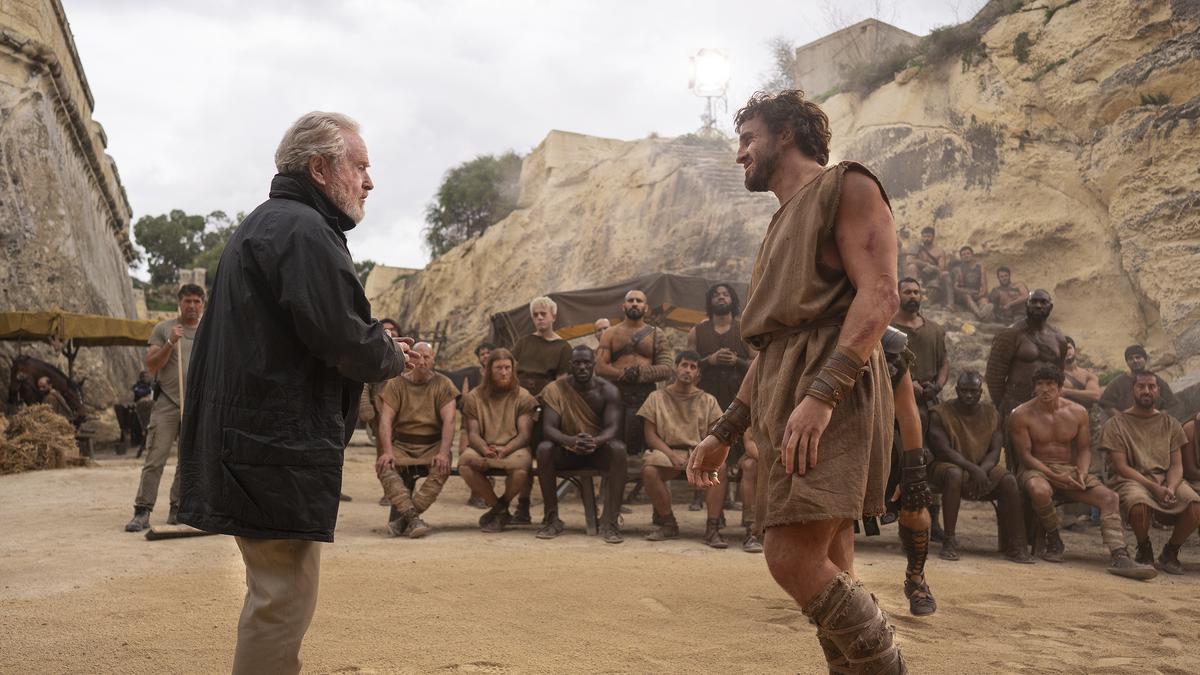Ridley Scott is back in the arena with Gladiator II

Ridley Scott’s Alien (1979) was just his second feature film but what an impact it has had on the public consciousness. A haunted house movie in space, Alien with its beautifully unsettling visuals of the spaceship, Nostromo, the slow burn climaxing in the alien bursting out of Kane’s (John Hurt) chest, and a thousand other details big and small, richly deserves its iconic status.
Though Scott, by his own admission, got into directing feature films late, at 40, at a time when his peers including Steven Spielberg, Brian De Palma, Francis Ford Coppola, and George Lucas had critically acclaimed and commercially successful films under their belt, Scott made up for lost time with a prodigious output.
Scott has had two releases in a year, three times — Hannibal and Black Hawk Down in 2001, Alien: Covenant and All the Money in the World in 2017, and most recently, The Last Duel and House of Gucci in 2021.
Alien was followed by another game-changer, Blade Runner (1982). Based on Philip K Dick’s meditative 1968 novel ‘Do Androids Dream of Electric Sheep?,’ the film starred Harrison Ford as Rick Deckard, a policeman hunting for rebellious ‘replicants’. Blade Runner set the template and palate for neo-noir and steampunk. The dystopian, rain-drenched, futuristic, and decayed Los Angeles of 2019, with neon bright billboards and cars flying silently by, was as immersive as it was disquieting.
Ridley Scott and Paul Mescal attend the global premiere of ‘Gladiator II’ in London, Britain, November 13, 2024.
| Photo Credit:
Mina Kim
‘Stealth feminist’
In 1991 came Thelma & Louise, cementing Scott’s reputation as a “stealth feminist”, in the words of Los Angeles Times film editor Joshua Rothkopf. The film about two friends Thelma and Louise, played by Susan Sarandon and Geena Davis, taking a weekend road trip to escape their horrendously boring middle-class lives, ends in the very definition of a cliffhanger.
The historical epic 1492: Conquest of Paradise (1992) about Columbus’ journey to the New World, starring Gérard Depardieu, Armand Assante, and Sigourney Weaver, could well have been a dry run for 2000’s Gladiator. Based on Daniel P Mannix’s 1958 novel, ‘Those About to Die’ (yes, like Roland Emmerich’s execrable eponymous show), Gladiator told the story of an honest, upright general, Maximus (an Oscar-winning turn from Russell Crowe).

Wicked, incestuous, patricidal Commodus (Joaquin Phoenix) has Maximus’ wife and eight-year-old son crucified and burnt while ordering Maximus’ death. The Praetorian Guards are no match for the battle-hardened Maximus who escapes after killing his captors. He winds up with a gladiator trainer where his superior prowess makes him a crowd favourite. When Commodus, as emperor, announces 150 days of games to honour his father, Marcus Aurelius, Maximus comes to Rome to exact his vengeance on all who wronged him.
Gladiator has aged excellently and the battles and savagery continue to thrill to the bone. Scott went on to make significant films in different genres, including two prequels to Alien — Prometheus in 2012 and Alien: Covenant. Scott’s ability to create immersive worlds whether it is the desolation of the red planet in The Martian (2015), war-torn Mogadishu in the kinetic Black Hawk Down, or Jerusalem during the crusades in the medieval epic Kingdom of Heaven (2005) is intoxicating, and addictive.
Scott is able to comfortably walk the line between gorgeously detailed worlds, high-octane action, and the people propelling the story. Amidst the blood, the dank corridors, and the relentless xenomorph, one does not lose sight of Ripley (a statuesque Sigourney Weaver) and her bravery, doubts, and fears.
Similarly, despite the blood lust of the Colosseum and the frenetic energy of the mob that is Rome (as Maximus is repeatedly told), Scott draws us into the stories of the characters. From the Numidian gladiator Juba (Djimon Hounsou) being stolen from his home to Commodus’ sister, Lucilla’s (Connie Nielsen), fears for her son, Lucius, and her love for Maximus, they keep the audience invested and engaged with larger vistas of blood and sand.
From the time it was released, there have been talks of a sequel to Gladiator including one featuring a resurrected Maximus. Thankfully, that was not followed up on and the brave general was allowed to enjoy the afterlife in peace.
Gladiator II, releasing today, tells the story of Lucius (Paul Mescal) who is revealed to be Maximus’ son. Now that is a hair-raising twist, considering Maximus tells Lucilla, his son is the same age as Lucius. And all the time we thought Maximus was an honourable man.
In Gladiator II, Lucius is sent away from the corruption in Rome to grow up in Numidia. Wicked Romans come anyway, kill his wife, and enslave Lucius. He decides to become a gladiator like his father and challenge Rome.
Denzel Washington and Pedro Pascal also star — the former as Lucius’ mentor and the latter as a general who served under Maximus. Scott returning to helm a sequel to one of his most critically and commercially successful films bodes well. The advance reviews are dizzy with praise for the blood-soaked action and the acting, particularly from Washington and Mescal. It is time for the games to begin. May the odds be ever in Scott’s favour.
Published – November 15, 2024 05:02 pm IST







